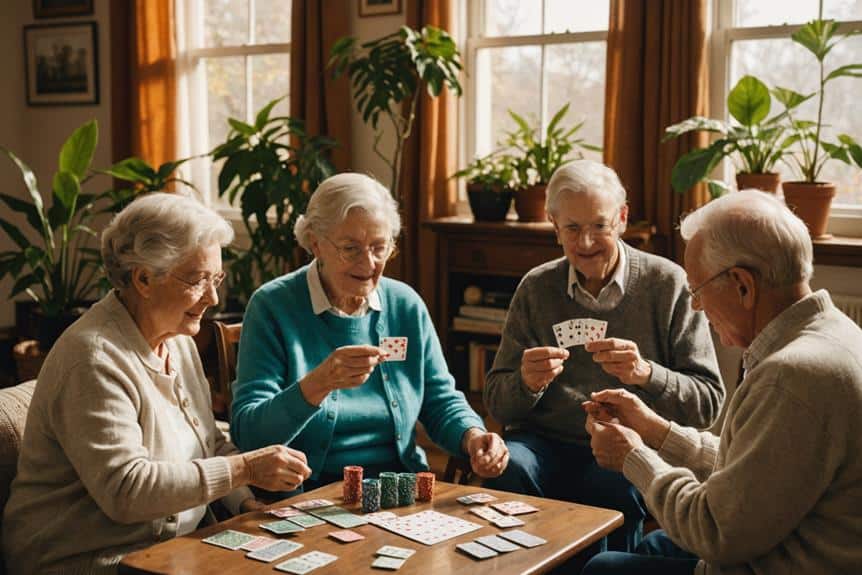To combat loneliness in seniors, consider engaging in various meaningful activities. Joining local community groups can help create friendships and a sense of belonging. You might enjoy attending social events, like tea parties or classes focused on hobbies. Participating in regular phone calls or using video chat can strengthen connections with family and friends. Volunteering not only fosters new relationships but also promotes personal growth. Exploring nearby parks or visiting museums can enhance social interactions while providing enjoyable experiences. If you explore this topic further, you'll discover more opportunities to connect and enrich your life.
Understanding Senior Loneliness
Understanding these factors is the first step in combating loneliness. The emotional impact of loneliness is profound and can have serious health consequences. Loneliness can increase the risks of depression, cognitive decline, and even shorten your lifespan—similar to the effects of smoking. When you lose social roles due to aging or disability, it can intensify these feelings of isolation. Additionally, cultural stigma around seeking help often makes it harder for you to address these emotions. Many seniors feel they must endure loneliness in silence, which only worsens their situation. The significance of support in addressing these issues cannot be overstated, as it can provide essential resources and emotional connection.
Recognizing these factors is the first step in combating loneliness. Understanding the emotional toll it takes on you can empower you to seek connections and support. It's vital to acknowledge that loneliness is not just a personal issue; it's a widespread problem that needs to be addressed. By identifying the causes and acknowledging the emotional impact, you can begin to take proactive steps toward enhancing your social interactions and improving your mental health.
Effective Connection Strategies
Regular phone calls with friends or family can also help maintain relationships. These calls provide a sense of belonging and reduce feelings of isolation. Additionally, utilizing a free Family and Funder App can enhance your communication with caregivers and family members, ensuring everyone is updated on your well-being. Don't hesitate to reach out; your loved ones will likely appreciate the effort just as much as you do.
Learning to use technology can greatly enhance communication. Consider taking some technology training classes to boost your confidence in using computers or smartphones. These skills allow you to connect with loved ones through video calls or social media, making it easier to stay in touch.
Participating in local community activities, such as clubs or classes, offers great opportunities for social engagement. These settings can help you meet new people and foster new friendships.
Community Resources for Engagement
Finding ways to engage with your community can markedly alleviate feelings of loneliness. Many resources are available to help you connect with others and find joy in social interaction. For instance, Re-engage offers free Sunday afternoon tea parties for individuals aged 75 and over. These community gatherings provide a lovely opportunity for you to meet new friends while enjoying tea and conversation. Additionally, exploring options for in-home care services can provide companionship and support, further enhancing your social experience.
The Silver Line helpline is a fantastic resource. It connects older adults like you with companionship and information about local activities, ensuring you stay involved in your community. Local libraries and community centers also host computer training sessions designed specifically for seniors. This can enhance your digital literacy, allowing you to connect with others online, which is increasingly important in today's world.
If you're looking for more social opportunities, consider joining organizations like the Women's Institute. They host social events that encourage older adults to participate in community activities and form new friendships. Volunteering is another great way to engage. National volunteering opportunities allow you to contribute to your community while building a social network.
Planning Meaningful Activities
- Regular Walks in Parks: Enjoying nature can boost your mood and promote physical health, while also providing opportunities for social interactions. Engaging in outdoor activities can also be part of a tailored care plan, as Comprehensive Home Care Services prioritize maintaining independence and dignity in daily life.
- Visits to Local Coffee Shops: These outings can be great for meeting friends or even making new acquaintances in a comfortable setting. Regular social interactions not only enhance emotional well-being but can also be integrated into personalized care strategies.
- Outings to Museums: Engaging with art and history can stimulate your mind and offer chances to connect with others who share your interests. Such activities can be promoted through caregiver support, ensuring seniors have the opportunity to explore their passions.
- Hobbies and Classes: Whether it's painting, cooking, or learning a new language, these activities encourage social interaction and skill development. With the right support, seniors can easily participate in classes that foster creativity and connection with others.
Utilizing free public transport options can also enhance your activity scheduling. This way, you can visit family, friends, and community events more frequently, breaking the cycle of isolation. Engaging in these activities not only helps you stay connected but also fosters a sense of belonging in your community.
Benefits of Volunteering and Learning
In addition to volunteering, participating in programs like the University of the Third Age (U3A) offers tailored learning experiences for older adults. These courses promote social interaction through shared interests, all without the pressure of exams. By joining U3A, you can explore new topics and hobbies while meeting others who share your passions.
Research shows that engaging in these activities greatly alleviates feelings of loneliness and improves overall well-being. When you participate in volunteer work or educational courses, you not only gain new skills but also foster connections that can lead to lasting friendships. The sense of belonging that comes from being part of a community is invaluable.





